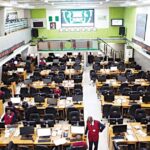
An author, Solomon Atala, has called on the Nigerian government to implement the use of its first languages in teaching and learning.
Atala, who is also an architect and oil palm farmer said this at the unveiling of his book titled, ‘The First Language, Our Hope: Ideas towards a Great Africa,’ in Lagos.
Atala revealed that on December 1, 2022, it was in the news that the Federal Government of Nigeria had rolled out a policy to the effect that the first languages must be used for instruction in primary schools.
He said, “I concluded that Africa is not modern because the continent has not used its first languages in the education of its people as done by others since the Renaissance. Other people dropped foreign Latin for their vernaculars since the 14th century. As I continued to research earlier efforts to validate my advocacy, I read about the experiment that Prof. Babs Fafunwa did from 1970 to 1978, with some students in now Obafemi Awolowo University, Ile-Ife. His experiment affirmed that students will do better when educated in the mother tongues.”
Atala was born on April 23, 1952, in Erinmo-Ijesa in Oriade Local Government of Osun State maintained that educating with the use of indigenous language would make every African literate, saying the Europeans imposed their language on Africans to lock them out of education.
Atala added, “Precisely in 1884/ 1885, at the realisation of the Second Industrial Revolution, seven European nations sat in Berlin, Germany to impose their languages and cultures on Africa. Their languages have locked up education from the majority of our people. That singular act sent Africa back to the Dark Ages which ended in the 15th century.
- Continued on www.punchng.com
“Educate everybody in Africa in the first languages, that means there will no longer be an illiterate person in Africa. And that will impact governance in the communities positively.”
Atala attended St Peter’s Primary School, Erinmo-Ijesa from 1959 to 1964, and between 1966 to 1970, he had his secondary school education at Methodist High School, Ibadan. He attended the University of Maryland, Princess Ann, Maryland in 1975.
In his review, Professor of English, Literature in English and Cultural Studies, Tayo Ogunlewe, said, “Solomon Atala’s The First Language, Our Hope: Ideas Towards a Great Africa is a timely and seemingly significant contribution towards the debate and advocacy for mother tongue education.
“More properly put, it is a call, loud and emphatic for a recognition of, not just the mother tongue but for a re-appraisal of the value and the need for better recognition and valuation of indigenous African and valuation of indigenous African knowledge systems.”
Speaking further on the book, he added, “Germans speak and write in German, Italians ditto, Japanese, and Chinese, ditto and I can go on and on.
“The book in its 22 chapters gives a sweeping overview of stories, values, practices/struggles, examples, and ways of knowing that continue to inform indigenous pedagogies and experiences. “The opening, from the prologue to chapter 7 gives the author’s perspectives on the Nigerian and American Constitutions, and leadership styles in comparison, interrogating the merits and demerits of each approach.
“Chapters 8-15 explore societal consciousness, values, faith, and liberty using biographical commentaries on notable African patriots like Nelson Mandela, Wole Soyinka, Fela Kuti, and Tai Solarin as icons of the struggle to emancipate and decolonize the African consciousness for repossession of Africa by Africans. Chapters 16 and 17 calls for the political will of African governments and their elites, using the Nigerian context as an example, for a return to regionalism as opposed to the present unitary arrangement that blatantly refuses to acknowledge the peculiarities and differences of the various ethnolinguistic groups.”




